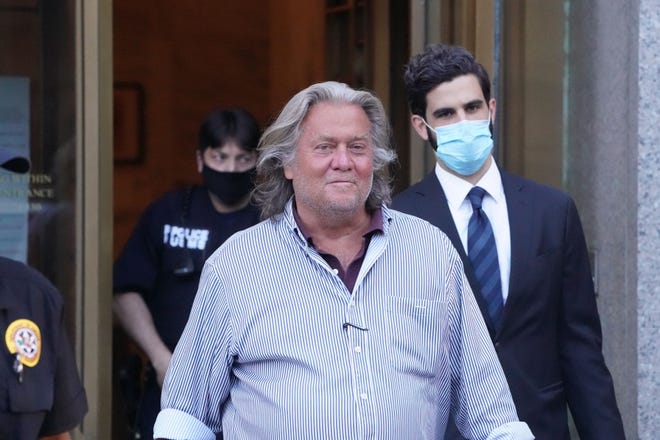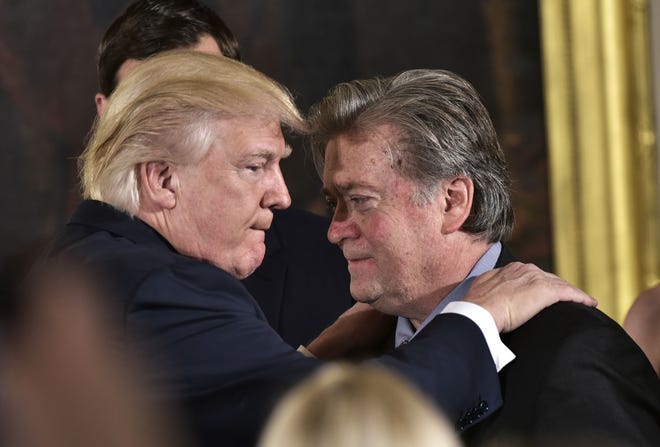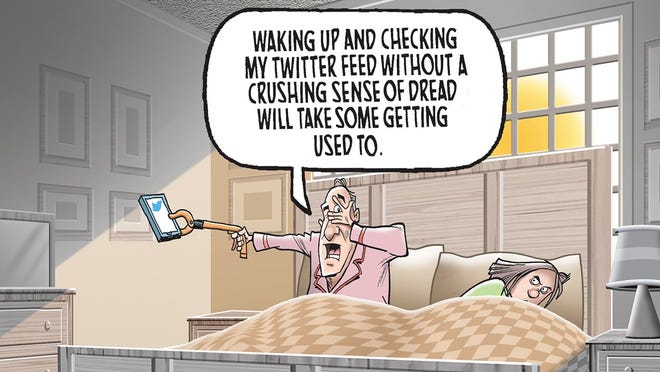After Donald Trump, limit unfettered presidential pardon powers
It could’ve been worse. Former President Donald Trump’s last-minute flood of pardons could have included many more controversial grants of clemency. That he did not pardon himself, his children or Rudy Giuliani is a pleasant surprise. Nor were controversial possibilities like Julian Assange or Edward Snowden on the pardon list. Trump’s choices might reflect his caution. His baser instincts could have been cowed by the prospect of an impeachment trial in the Senate.
What we got from Trump is something more akin to the traditional way in which presidents have used and misused their pardon power on the way out the door — but as with so much about Trump, he took past practice and sank it to a new level of corruption and connection. The pardons of Steve Bannon and Albert Pirro Jr., in particular, both echo historical practices and fracture them.
To be sure, past presidents have misused their pardon powers on the way out the door. To take but one recent example, Bill Clinton pardoned Susan McDougal, who had kept silent rather than testify against him in the Whitewater cases. Clinton also infamously granted a pardon to financier Marc Rich, who was a fugitive from justice abroad and whose family made significant political contributions to the Democratic Party.
An affinity for corruption
Those pardons, like many of Trump’s, had the whiff of inappropriateness and corruption about them. But none of them broke the norms of presidential behavior as severely as Trump’s pardons did. These other missteps were, you might say, the cost of having a constitutional pardon power in the first place.
Pardons were conceived by the framers of our Constitution as a necessary outlet to guard against overreaching by the legislative and judicial branches. In one mode, pardons were intended to allow the president to do justice in cases where the law was overly harsh or where the judicial system had failed to render an equitable judgment.
Some of Trump’s pardons this week have that character. His commutation of the sentence of Jawad Musa (serving life in prison for a nonviolent drug offense), seems as though it was done at least partially out of a genuine concern for the harshness of the criminal justice system. Similarly, when he pardoned the boxer Jack Johnson in 2018, Trump was correcting what many rightly perceived as a racist injustice of the past.

The framers of the Constitution also saw the pardon as a way of smoothing the political waters and ending contentious social disputes. Jimmy Carter’s decision to pardon those who had resisted the draft and avoided service during the Vietnam War was an effort to end the contentious debate about the war and put it behind us. Most famously, of course, Gerald Ford’s pardon of Richard Nixon was a well-intentioned attempt to end the trauma of Watergate. None of Trump’s pardons this week seem intended to heal the political turmoil in the country — indeed, they will only exacerbate it.
Never a bottom:The defining phrase of Donald Trump’s presidency was ‘new low’
And so, most of Trump’s pardons announced in his late-night announcement do not reflect either of the framers’ stated goals for the pardon power. They are neither efforts to cure individual injustice, nor are they efforts to unite the country and smooth the roiled political waters.
Rather, these pardons, coming on top of his other post-election pardons of cronies like Roger Stone and Michael Flynn, largely reflect the worst instincts of earlier pardon abuses in American history. Collectively, they embody an affinity for corruption and a willingness to exercise the pardon power on a personalized basis to the benefit of or punish those whom the president chooses.
In this last round, corrupt political operatives like Paul Erickson (a GOP adviser who defrauded investors in an oil company) and Ken Kurson (a friend of Jared Kushner, charged with cyberstalking his ex-wife) got clemency. So did corrupt businessmen like Sholam Weiss, who was serving an 800+ year sentence for a massive insurance fraud. Also on the list: GOP fundraiser Elliott Broidy, a Trump contributor who pleaded guilty to acting as an unregistered lobbyist for foreign interests.

Less than an hour before Biden took the oath of office, as the inauguration ceremony unfolded at the Capitol, Trump gave a last-minute reward to Fox News host Jeanine Pirro for her unstinting sycophantic support: a pardon for her tax-evader ex-husband, Albert. But even that couldn’t top Trump’s pardon of Bannon, his former political adviser, as the most perfect example of Trump’s personalized affinity for power and corruption.
Bannon was awaiting trial on charges that he defrauded Trump supporters by soliciting more than $25 million in donations for a fundraising campaign called “We Build the Wall.” Instead of funding construction of Trump’s border wall, some of the donors’ money went into the pockets of the fundraising executives — including $1 million to Bannon.
Rewarded for defrauding Trump base
Though Bannon was, in times past, critical of Trump, he has returned to the Trump fold. Indeed, one reason for the pardon is that he could be particularly useful to Trump if the former president follows through on his reported decision to form a new party. On the other hand, Bannon may still be subject to fraud charges in various state courts, so his pardon might be uniquely Trumpian in nature — political dynamite yet only partially effective.
More to the point, it is perfectly “on brand” and emblematically “peak Trump” for him to reward a vital elite political supporter like Bannon even though Bannon defrauded the political base with whom Trump professes affinity. In the con man’s last con, the rubes lost again.
Disgraceful exit:Trump is a lot like his mentor, my cousin Roy Cohn. Now he’s leaving like him.
The unfettered nature of the president’s pardon power was an intentional choice made by the Founders of the Republic to allow the executive branch a way of ameliorating legislative and judicial abuse. They gave the president this power hoping and expecting that it would be used judiciously and wisely. Trump’s exploitation of that unfettered authority calls the underlying assumption of presidential reasonableness in its exercise into question.
On the other hand, the Trump pardon extravaganza was (thankfully) different more in degree than in kind from those that have come before him. Perhaps we have dodged a bullet, for which we should be grateful. Even so, for the nation to have been obliged in these past weeks to even to contemplate the possibility of a corrupt self-pardon — or preemptive pardons for family members — shows us the potential for abuse in new and troubling ways. The time has come for us to consider whether or not we need a constitutional correction to the framers’ vision of the unfettered pardon power.
Paul Rosenzweig, a senior fellow in the National Security and Cyber Security Program at the R Street Institute, was senior counsel to Kenneth Starr in the Whitewater investigation and a deputy assistant secretary of Homeland Security in the George W. Bush administration. Follow him on Twitter: @RosenzweigP

